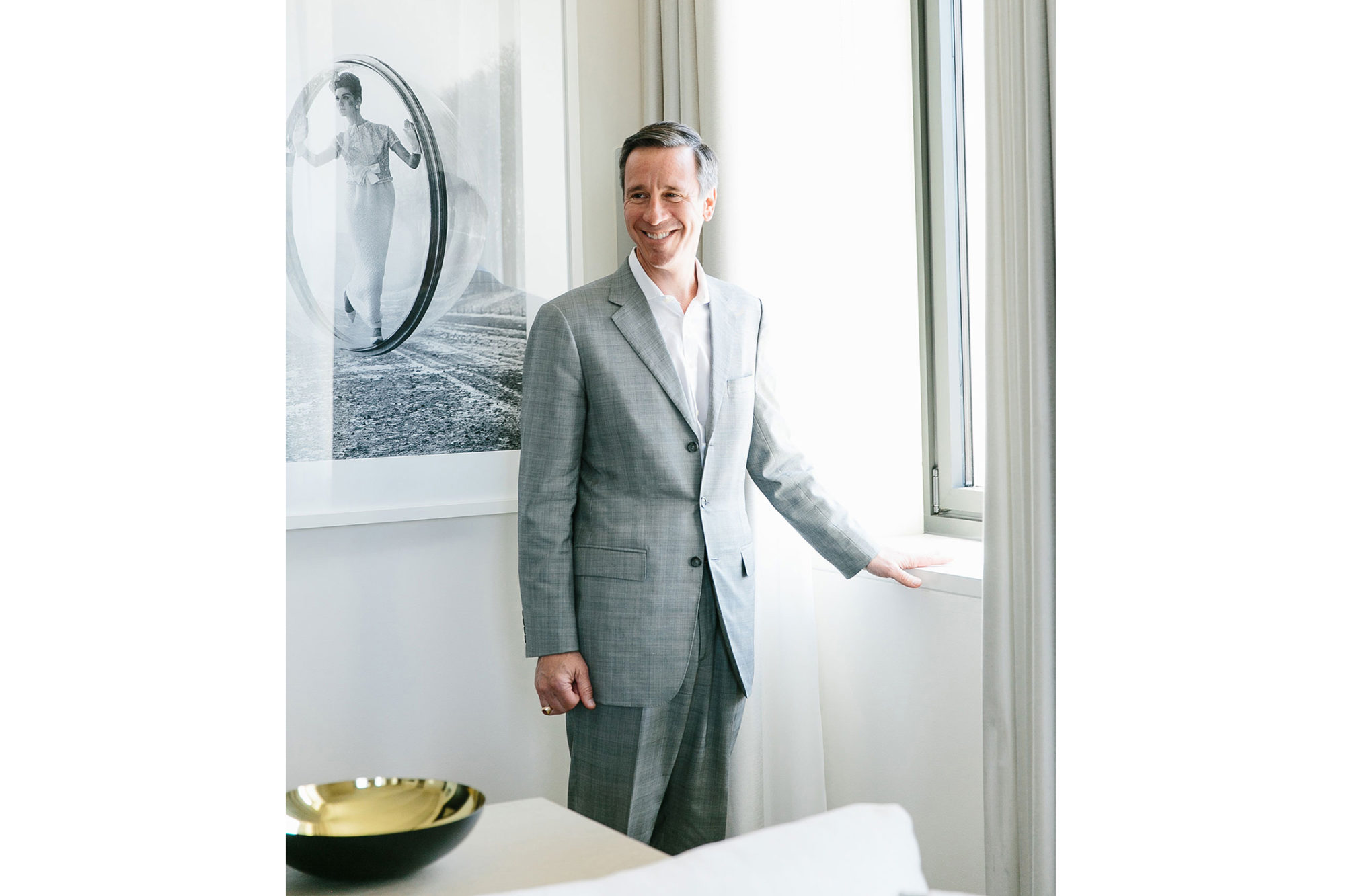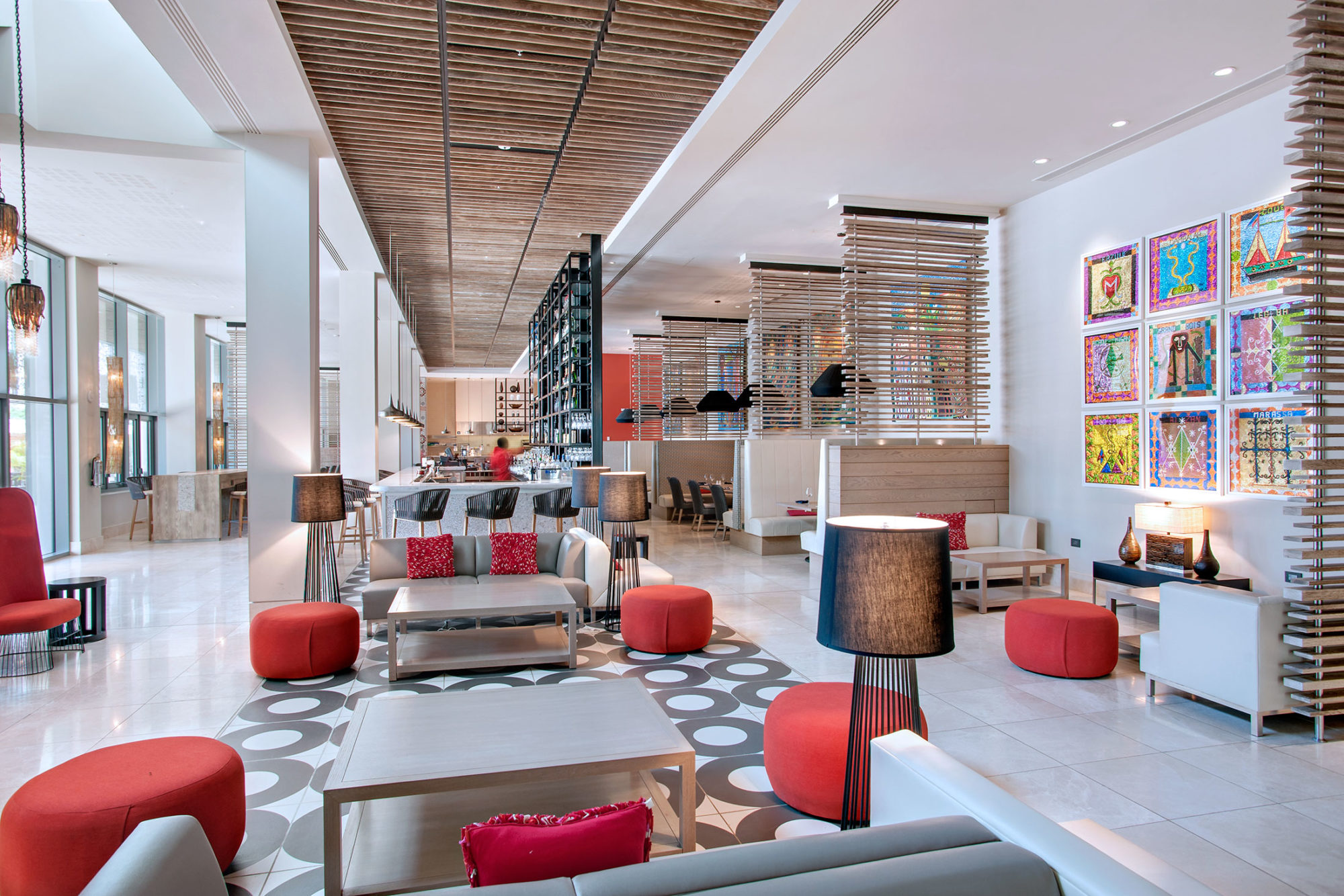Following the 2016 mega-merger of Marriott International and Starwood Hotels and Resorts Worldwide, CEO Arne Sorenson helmed the world’s largest hotel chain. Only the third CEO in the company’s history, and the first non-family member, Sorenson was diagnosed with pancreatic cancer in 2019. Despite his battle with the sickness, he guided Marriott through the coronavirus pandemic until taking a step back this past month because of increasing treatment demands. As is apparent below, Sorenson was the consummate road warrior and an example of humanist leadership. In our conversation, he tells Surface about everything from sustainability and LBGT rights to the importance of good design and listening to the competition.
You’re the first non-family member to hold the CEO title at Marriott. Tell me about your path to the top.
I never had a clear plan. My father and both of my grandfathers were Lutheran preachers, and I was born in Japan, where my dad had been posted since 1945. I later went to college and law school, and then worked as a lawyer in Washington, D.C., where I began representing Marriott in 1992. Bill Marriott called and asked me to come to the company, and I said I would, but not as a lawyer. So my first job—more than 20 years ago—was to run mergers and acquisitions. I later became the CFO—a slightly weird move on Mr. Marriott’s part, as I didn’t have the background for it, but he said, “You’ve got a great team, use your judgment, and you’ll figure it out.” I actually don’t think he could do that today. I transitioned to the role of president for a few years, and was appointed CEO in 2012. And while I’m not a family member, everyone had a chance to think about this transition over for a few years. By the time it happened, it was easy.
What’s the culture of the company?
Across the board we put our people above our customers. Of course, our customers are important to us, but the 375,000 employees who wear our name badge are on the front line, and we want them to be empowered, motivated, and happy. If they aren’t, they won’t deliver the kind of service expected of all our brands.
Another part of the cultural story at Marriott is that people talk about people, not their pedigree. So often what we hear is “they went to Harvard” or “they’ve worked for McKinsey” or whatever it is—but that has never been the conversation at Marriott. It’s always about looking at the position a person has now compared to where they started within the company—the general manger who came in as a security guard or the woman running international operations who came in as a pool attendant.
How did the Starwood deal play out?
At first we decided to pass because it was just too expensive and looked like a lot of work. But we changed our minds because of the relative valuations of the companies, and we believe that we can accomplish something by being bigger. There had been rumors about Hyatt buying Starwood, but our announced bid was totally unexpected: It was put together in three weeks and two days.
Then Anbang steps in. They bid 11 or 12 percent more in cash, and in lighting speed, they fully financed that bid. Starwood picked it. We’d done a lot of work, and rather than just walk away, we teed up the best deal that we were prepared to do. Why give up without putting your best foot forward? We announced our revised deal on the Monday I’m in Cuba with President Obama. It then takes a full week before Anbang surfaces again with another bid, which is higher by a billion and a half dollars of financing, which they couldn’t deliver. Why they couldn’t, we don’t know—but we were back to getting our deal done.
Post-merger, will there be enough room for the 30 distinct hotel brands to retain their identities? For example, can Ritz-Carlton and St. Regis co-exist with business as usual?
All of the brands will keep their relative positioning, and the loyalty program serves as the umbrella for all of them. But we’ll try to emphasize swim lanes between the brands: Ritz-Carlton and St. Regis in the luxury segment, Edition and W Hotels in the lifestyle group, and AC Marriott and Aloft. These last two are similar in terms of psychographics, a word that I hate—AC has a European flavor while Aloft is about an American lifestyle. I don’t have all the answers—we’ll figure out what service and design cues, as well as food and beverage cues, we can implement over time to make a brighter distinction between these brands.
How important is design to the overall Marriott brand?
I’m very interested in design, but I’m a lawyer by training, so I think our owners would shudder if they thought I was going to direct them in this area. The Edition partnership with Ian [Schrager] has been great, and I’ve loved being involved with the development process of the brand. My personal preference is for Midwestern design—Prairie School, Frank Lloyd Wright—and the use of natural woods and windows. I would love to work with Tom Kundig, specifically because of his use of windows and light.
Who do you like working with from a design perspective?
I’ve been very impressed with Yabu Pushelberg, David Rockwell and his team, John Pawson, and while I haven’t worked with her, I like Jeanne Gang’s work quite a lot.
Which competitors do you think are doing interesting things and why?
The whole boutique thing is very powerful. I think a lot of credit goes to Ian Schrager. Some of the independents that have popped up in the last decade—The Bowery Hotel, the Tribeca Grand, The Mercer—are all really compelling.
How much of your time is spent on the road?
Two hundred nights a year, all over the world. I don’t attend many conferences, but Davos is an exception, because we accomplish so many different things: All of our big customers are there, and we can address travel policy issues more easily. Technology companies that we’re trying to partner with—or that we’re worried about—are also there.
How do you view the sharing economy and the rise of companies like Airbnb? Do you have plans to compete in this space?
It’s fascinating. I hope we’re not as exposed to this as the taxi industry is right now. Taxis in many cities are awful and hard to find. So here comes Uber with a better product. In the hotel business, I still think we can deliver better service, so we don’t have quite the same risk. Airbnb is fascinating. Increasingly, it’s less personal, and there are more dedicated units. The more they get into that space, they become a competitor. The story isn’t over, but we’re set up to compete well.
How is the controversial new “bathroom law” that affects LGBT rights impacting your businesses in North Carolina?
There is already $100 million of business that has run away from North Carolina because of this. I think the thing that is so sad about this legislation is that it doesn’t do justice to the people of North Carolina, who are warm and welcoming. It’s just a law intended to drive a wedge between people. It’s judgmental, bad for business, and just awful. Period.


